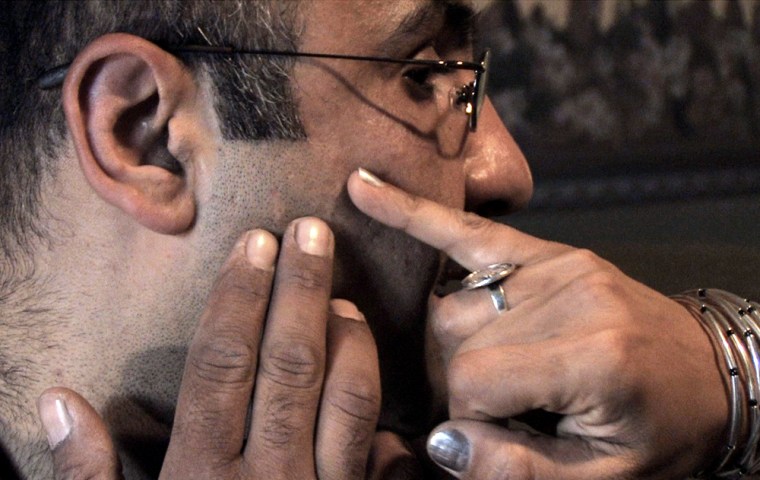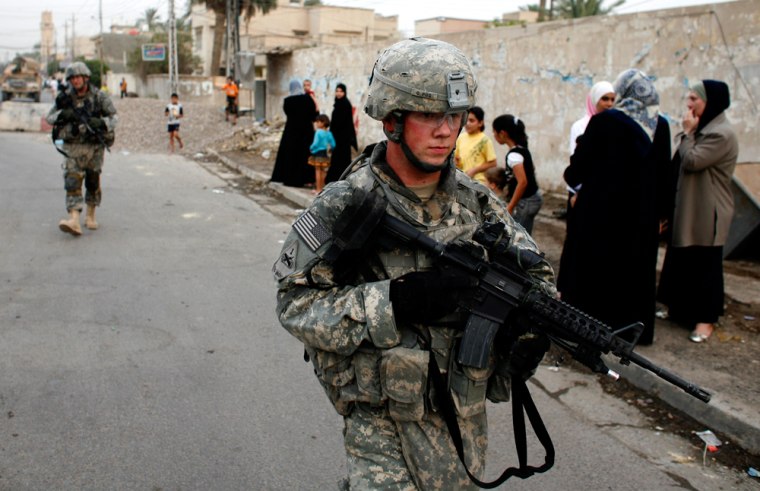As the congressional debate over the future American role in Iraq intensifies, members of Congress are increasingly considering what might happen as the number of U.S. troops is reduced.
Among the unanswered questions: how many Iraqis should be allowed to enter the United States as refugees?
Legislation introduced three weeks ago by Sen. Edward Kennedy, D-Mass., and Sen. Gordon Smith, R-Oregon would create a special immigrant visa for Iraqis who have worked for U.S. diplomats or military forces in Iraq.
Under this part of the Kennedy-Smith bill, up to 25,000 Iraqis over the next five years could come to the United States.
In addition the bill would designate as priority refugees Iraqis who worked for the U.S. government, or worked for American news media companies or non-governmental agencies. They’d be eligible to come to the United States as part of the 70,000 refugees admitted each year.
Two weeks ago, the Senate scuttled an immigration bill cosponsored by Kennedy and supported by President Bush. The debate over that bill was marked by concern over the security of U.S. borders and the possibility of terrorists slipping into the country.
Iraqi implicated in Glasgow attack
At least one of the doctors involved in the Glasgow bombing last week in Great Britain, Dr. Bilal Abdulla, was an Iraqi. Could there be more Dr. Abdullas among the refugees headed to the United States?
Smith said those allowed in to the United States under the Kennedy-Smith bill “need to be fully vetted and our bill provides for that. We don’t want to be importing terrorism, but we also have an obligation to Iraqi refugees who are refugees because they were supportive of us.”
Some senators voiced caution about the refugee issue.
“I think the real challenge is getting Iraqi professionals to repatriate, to go back to Iraq and take up the reconstruction of their country,” said Sen. Jack Reed, D-R.I., just back from his tenth trip to Iraq since the 2003 U.S. invasion.

He added, “There are cases, I’m sure, where someone has been of such assistance and is so identified with the government of the United States that on a moral basis we owe them, if they choose to come here. I would suspect in that category of people, they’ve already been thoroughly vetted before they started working for us.”
Reed added, “I’m less concerned about that than I am about an open-ended kind of program, if you claim you were subject to some kind of recrimination (in Iraq) you can come (to the United States).”
In such a large-scale asylum program, he said, “There might be people coming in under false pretenses.”
Need for asylum, but wariness
Sen. Jeff Sessions, R-Ala., one of the leaders of the coalition that scuttled the immigration bill, said, “I would continue our tradition of having a significant number of asylum seekers come into the country. There probably is a need for a certain number of Iraqis to seek asylum here.”
But, he added, “absolutely there is a danger” of potential terrorists entering the country.
Like Reed, Sessions worries about a “brain drain” from Iraq. “It’s important that our focus be on restoring a stable Iraq, and not on facilitating or encouraging people to flee the country,” said Sessions. “What’s important is that people stay there and fight for a good and decent Iraq.”
Smith said he agreed with that goal.
“Obviously we want to encourage them to stay there and to rebuild, but we also know there are some who are marked for death and we have an obligation to those people,” the Oregon Republican said.
The United States has allowed in 133 Iraqi refugees over the past nine months, despite a State Department promise made in February to process 7,000 refugee applications by the end of September.
In the fiscal year that ended last September, the United States admitted a total of 41,150 refugees, with Somalia being the leading country of origin.
Some human rights advocates point out that as the Vietnam War ended President Gerald Ford decided to allow more than 130,000 Vietnamese to come to the United States.
But Ellen Sauerbrey, Assistant Secretary of State for Population, Refugees and Migration, contended in a letter to the Washington Post last week that “Iraq is not Vietnam, and conditions today are different from those in 1975. Unlike Vietnam, we have not left Iraq. Unlike 1975, in today's post-Sept. 11 world every individual seeking resettlement must undergo rigorous security screening to ensure that anyone wishing to harm Americans is not admitted to the United States.”
Eleanor Acer, director of the Refugee Protection Program at the advocacy group Human Rights First, said it is “just wrong” to imply that the U.S. does not yet need a more robust refugee program because United States forces have not yet left Iraq.
“This kind of crisis can not be dealt with only after the war is over,” Acer said.
A question that most in Congress have not yet addressed is what impact Iraqi refugees might have on states and cities.
Ohio Gov. Ted Strickland, a Democrat, said last February he did not want Iraqi émigrés in his state.
“Ohio and Ohioans have contributed a lot to Iraq in terms of blood, sweat and too many tears,” he said. “I am sympathetic to the plight of the innocent Iraqi people who have fled that country. However, I would not want to ask Ohioans to accept a greater burden than they already have borne for the Bush administration's failed policies.”
Sen. Blanche Lincoln, D-Ark., said Wednesday she hadn’t yet had a chance to study Kennedy-Smith bill. But she said her state had long experience in serving as a home for refugee and émigré populations.
“We’ve had several,” Lincoln said. “We had Vietnamese, we had Cubans, we had Marshallese; we’ve had a lot of those who have sought political asylum and refugees that have come through as well. It’s one thing to say you want this to happen, but it’s another thing to say that you are going to provide for it in perpetuity.”
